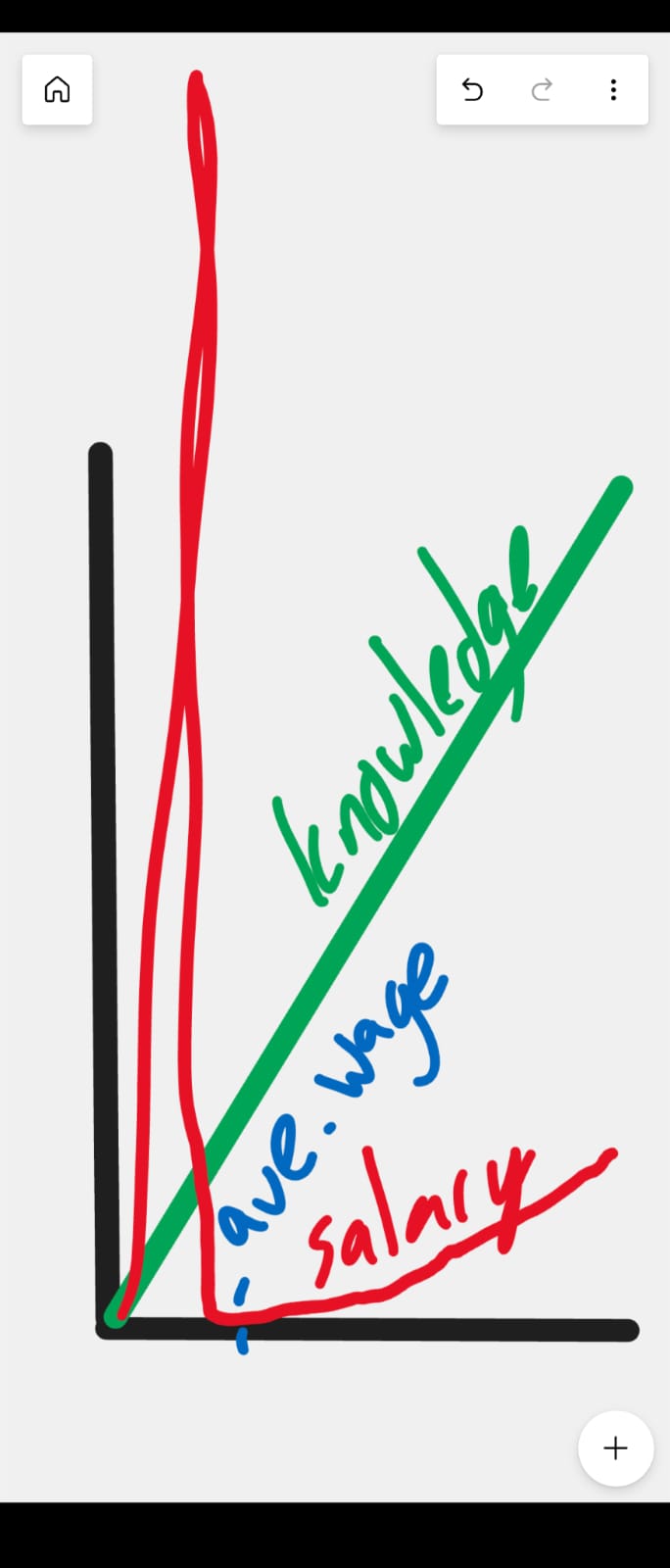So I’m 20 and I’ve started looking at the salaries of jobs/careers, and this is the impression I’ve gotten. Like that you could spend years cramming a ton of knowledge about a very niche field, and still only get 2-3x what a run-of-the-mill job makes. Is this true? If yes then I guess this route to wealth would only make sense (due to the diminishing returns) if the topic truly spoke to you, right? Are there alternative career paths to good pay than being really good at something really specific?
LABEL YOUR FUCKING AXIS AAAAAAAAAA
I can clear that up for you. The X axis is vibes and the Y axis is vibe dependent vibes.
I’m actually not sure how you’d label the axis here. The info being conveyed is the relationship between two separate things.
X would be hardness of job and y would be salary
What are your x and y axes here?
Generally speaking, wealth is not built by working. It’s built by investing. It’s possible to have a relatively small salary and get relatively wealthy if you consistently live below your means and invest the surplus. Power of compounding.
Oh I see, I will keep this in mind. Yeah I suspected that any jobs that got you super good money were not because of the knowledge but because of playing the game/luck.
Salary really depends on value provided or enabled. That’s why more knowledge stops mattering at a certain point, someone with a month of experience driving a forklift is less valuable than someone with 3 years, but 6 years of experience isn’t significantly different.
There’s also benefits to being closer to money to show value. This is why sales jobs tend to pay better, as showing direct responsibility for 1 million in sales vs keeping the machines running that made the product.
I actually just got told something similar. In a resume was listed, “over 10 years of leadership/management experience” and the recruiter reviewed it and said, “i don’t care. I can find 20 other people within two minutes who have 10+ years of experience. Tell me what the skills are.”
Tenure in a position means very little. Every year is a diminished return of value.
There’s also benefits to being closer to money to show value
Ah that’s a good tip actually
Your graph is missing the more important factor: demand.
I’m guessing you weren’t born into money, which is what most ultra wealthy people do. So failing that, you need to cultivate a skillset which includes doing something that other people want and are willing to pay for. And yes, that often means learning specialized, or dangerous skills. Take something like a high voltage electrician, they can make good moeny but they need a specific skillset, certifications, and fucking up can mean dying very quickly. Construction divers or underwater welders can earn good money as well. Though again, specific skillsets, certifications, and risks. On the less risky side, programmers can make good money, though that usually does require a lot of learning. IT and cybersecurity also fit this bill, though they do tend to follow your graph.In short, businesses pay for people because they have a need for something to get done. No need, no money. You can be the most knowledgeable person in the world about flaking stone tools, and you are going to be struggling. Another route to income is starting your own business, but this has similar pitfalls. Start a business which people aren’t interested in and you’re going to flounder. Also, running a business does take it’s own skillset, beyond the skillset involved in whatever the business’s focus area is. Though, done right, you can focus on running the business and hire people to do the other stuff.
You are falling into a trap a lot of young, smart people do. You are assuming that knowledge and intelligence is what you need to succeed. It’s not your fault, you’ve been fed that line for the last 12-ish years of your life by schools and society. It’s bullshit. They do help, but knowing the right people, luck and the ability to socialize are more important. In short, go to business school and go into management. If that doesn’t appeal to you (and that is perfectly valid) then you need to find and learn skills that businesses are willing to pay for. At the moment, that probably means a trade, like electrician or welder; or, a technical role such as engineering, IT or programming. If your interest is in the Humanities, sorry you’re probably fucked.
Networking in university got me my first jobs and they were very good starting jobs.
I don’t mean you have to go out and be fake, but get involved in a bunch of stuff, and make sure to check if your department has any corporate relationships you can use.
Meeting people pays the best dividends in life.
Meeting people pays the best dividends in life.
Mmm well said. That makes sense
Who you know, and the opportunities they afford is a game changer for career trajectory.
The big reason to pay money or get into a good school isnt that the education is of that much higher quality, its about who your friends are, and more importantly what their parents or parents friends do. You have a friend all through school and one day you are like ‘i wanted to get an internship somewhere but im not sure how to go about it’ and then your friend is like ‘oh my mum/dads friend is a senior manager/team leader at XY good company, im sure they can find you a placement.’But saying this, it is “who you know not what you know” until your in the job and its a matter of time until it becomes “what you know and who you know won’t save you”, except the rare circumstances where your working for dad in the whitehouse or something.
You are falling into a trap a lot of young, smart people do. You are assuming that knowledge and intelligence is what you need to succeed.
Thank you for telling me this
IT and cybersecurity also fit this bill, though they do tend to follow your graph.
You’re right! These kinds of jobs were the ones I was initially looking at (the cliche that engineers make good money is true but you’re right, the diminishing returns do start to kick in)
Is there a field where that red curve is flipped so that each extra aquired unit of expertise earns you exponentially more money?
Continuing to work for the same company will only provide +2% to +4% per year regardless of knowledge gained. You aren’t paid for how much you know.
To get the large gains in income, you have to re-set your salary by changing jobs, at which point you get one big bump, then go back to +2% to +4% per year.
Or instead, form a union and demand better pay and retention incentives.
I see, it’s useful for me to know that it will work like this.
Con man? CEO? Hedge fund manager?
But seriously, generally anything having an exponential return in this world is pretty unusual and generally not guaranteed if it’s a desirable outcome.
Particularly in a capitalist economy, the business only has to pay you just enough to not leave for a competitor, they don’t need to pay you the true value of your ability unless you’re basically the only person on the planet with the necessary skills.
On the flip side, in booming industries that require specific skills such as tech, you can generally get a pretty linear progression for a while before it plateaus in a good number of organisations.
When Epic started hiring every software engineer in video games they flipped that red curve, at least to the right of that blue line.
Trades. If you are a plumber or an auto mechanic you can make a killing. Doubly so if you own the business. If I had it to do over again I would get a business degree and then become an electrician.
Corrupt politician.
I don’t think there’s a strong relation between knowledge and salary. It’s more likely demand and supply - if specific skills are in demand, and not many people have them, then pay will increase. And at the highest levels it’s often not what you know, but who you know that matters.
Play around with this for a bit: https://networthify.com/calculator/earlyretirement?income=50000&initialBalance=0&expenses=20000&annualPct=5&withdrawalRate=4
Consider spending 30k yearly when you’re earning 50k. You can retire in about 20 years if you keep to that. You really gotta keep to it though, spending 40k means you’d have to work almost 40 years instead.
Now compare that to spending 30k when making 100k. Now you can retire in 9 years. Even if you have to spend literally twice as much time+effort doing so, you end up with more of your life leftover.
This is not to say that you should take a job you hate, but rather to say that making more money does make your life better, but only up to a point. If you find a job that you genuinely enjoy, great do that. If you’re picking between different things you dislike, translate it back into years instead of trying to understand it in made up funny money numbers. And when you get there, stop.

This is my take on it. That unexpected spike in the salary is slightly skewed stats from the billionaires with all the money and none of the knowledge.
Then it goes back down to nearly 0 where most of our average wages actually are.
Source: My source is that I made it the fuck up, but it’s certainly what it feels like when you see the clueless assholes with money and power.
I would have agreed with this chart a decade ago but not now. I recently quit being an systems engineer to being a high voltage electrician. My job stress and required knowledge went down considerably, my pay went up 2x. I would love to recommend school but cannot as I feel like it was a waste for my career path.
Its funny, I’m.the one that makes the least amout of money in my team. They hired 2 new people and both make 30% more than me. Besides the fact that I’m a woman I’m the one that puts the least effort into things and I don’t want to be promoted or to have “more responsibility” so I’m fine with it and so is the company. I do the bare minimun and go home happy. no extra learning, certifications, politics…nothing.
That must be nice, it’s my plan too tbh if it still manages to pay the bills. I agree it’s important to have a sense of Enough.
I said “I love the Y carrer path”. Everyone respected. I was honest about loving the operational and not wanting bullshit
You’re out of touch with reality with this idealist conception of wages as a result of knowledge. The value of labor is the cost of its reproduction. Capitalists pay workers exactly as much as they need to for them to turn up again the next morning. Knowledge does not directly factor into their calculation. Don’t expect to be rewarded for the work you put into your education - the system isn’t fair and doesn’t work like that.
Instead, wages are the result of a collective power struggle between labor and capital. High wages occur either when labor is strong and capital weak or when you betray other workers and aid capital in their exploitation.
Now expert knowledge is one of many things that might help by increasing bargaining power in the struggle with capital, but it’s neither necessary nor sufficient. For example an automotive engineer might have just as much knowledge as a chemical engineer, but where I live, chemistry earns you about 50% more, because the chemistry union is stronger.
So union power, strikes and social movements are a big factor. Others are location, the average rent, international competition, the reserve army of labor. At any specific time, the boom and bust cycle of periodic crisis strongly effects wages.
The organic composition of capital plays an indirect role: If the degree of automation suddenly rises, this will lower workers bargaining power short term and lower profits long term which increases pressure on wages.
So if you want a career with stable, high wages but don’t want to help exploit others, look for sectors with a long-term chance of a strong bargaining position for labor.
Nassim Nicholas Taleb talks about this when he explains his own career. He realized the amount of effort he had in him was never going to change, so he wanted a field where earnings weren’t limited by his own effort - the dream of passive income. He became an expert on risk and a well known writer. https://en.m.wikipedia.org/wiki/Nassim_Nicholas_Taleb
Agreed, good tip. Yeah his persective is certainly valuable
You don’t promote good workers, the job description changes with promotion so the previously good worker might not be (as) good anymore.
Good workers with lots of expertise and know-how get more work.
[off topic]
There’s at least one store I know of in New York City that’s been making money off of doing VCR repairs for decades. A lot of companies invested in big video displays back in the day and it would cost far more to replace everything than it does to keep the antique tech going.
Some people are still learning Cobol.
https://www.cio.com/article/240709/why-its-time-to-learn-cobol.html
If you can find a niche tech like that it would make sense.










